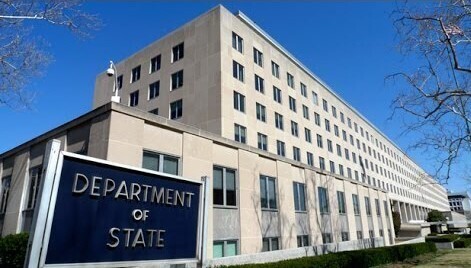hankyoreh
Links to other country sites 다른 나라 사이트 링크
US State Department indirectly opposes S. Korean proposal to readjust working group

In response to a query about South Korean Unification Minister Lee In-young’s remarks about the need to readjust the South Korea-US working group, the US State Department said on Aug. 18 that the US and South Korea regularly coordinate diplomatic efforts, sanctions implementation, and inter-Korean cooperation.
By reemphasizing the coordinating role of the working group, the US State Department appears to have indirectly expressed its opposition to the proposed readjustment. When the two countries set up the working group at the end of October 2018, on the heels of the inter-Korean summit in Pyongyang in September 2018, the US State Department said that they were bolstering their close coordination of foreign policy, denuclearization efforts, sanctions implementation, and inter-Korean cooperation.
There are also indications that American experts are not in favor of readjusting the working group. Evans Revere, former principal deputy assistant secretary of state for East Asian and Pacific affairs, told Radio Free Asia that Lee’s characterization of the working group as an obstacle clashes with the US’ position that the working group provides a valuable review of hasty actions. The working group is especially important because the US and South Korea don’t always have the same idea about how to deal with North Korea, Revere said.
During a meeting with US Ambassador Harry Harris at the Central Government Complex in Seoul on Aug. 18, Lee said that “the operations and function of the South Korea-US working group need to be readjusted and rearranged so that it can clearly serve to promote the development of inter-Korean relations and a policy of peace on the Korean Peninsula.”
“This will help us assuage concerns raised in some quarters that the working group is functioning as a mechanism to restrict inter-Korean relations,” Lee said.
By Hwang Joon-bum, Washington correspondent
Please direct comments or questions to [english@hani.co.kr]
Editorial・opinion
![[Column] Has Korea, too, crossed the Rubicon on China? [Column] Has Korea, too, crossed the Rubicon on China?](https://flexible.img.hani.co.kr/flexible/normal/500/300/imgdb/original/2024/0419/9317135153409185.jpg) [Column] Has Korea, too, crossed the Rubicon on China?
[Column] Has Korea, too, crossed the Rubicon on China?![[Correspondent’s column] In Japan’s alliance with US, echoes of its past alliances with UK [Correspondent’s column] In Japan’s alliance with US, echoes of its past alliances with UK](https://flexible.img.hani.co.kr/flexible/normal/500/300/imgdb/original/2024/0419/2317135166563519.jpg) [Correspondent’s column] In Japan’s alliance with US, echoes of its past alliances with UK
[Correspondent’s column] In Japan’s alliance with US, echoes of its past alliances with UK- [Editorial] Does Yoon think the Korean public is wrong?
- [Editorial] As it bolsters its alliance with US, Japan must be accountable for past
- [Guest essay] Amending the Constitution is Yoon’s key to leaving office in public’s good graces
- [Editorial] 10 years on, lessons of Sewol tragedy must never be forgotten
- [Column] A death blow to Korea’s prosecutor politics
- [Correspondent’s column] The US and the end of Japanese pacifism
- [Guest essay] How Korea turned its trainee doctors into monsters
- [Guest essay] As someone who helped forge Seoul-Moscow ties, their status today troubles me
Most viewed articles
- 1[Column] The clock is ticking for Korea’s first lady
- 2After 2 months of delayed, denied medical care, Koreans worry worst may be yet to come
- 3[Column] Has Korea, too, crossed the Rubicon on China?
- 4[Correspondent’s column] In Japan’s alliance with US, echoes of its past alliances with UK
- 5Samsung barricades office as unionized workers strike for better conditions
- 6All eyes on Xiaomi after it pulls off EV that Apple couldn’t
- 7US overtakes China as Korea’s top export market, prompting trade sanction jitters
- 8Hong Se-hwa, voice for tolerance whose memoir of exile touched a chord, dies at 76
- 9[Photo] Smile ambassador, you’re on camera
- 10[Editorial] When the choice is kids or career, Korea will never overcome birth rate woes